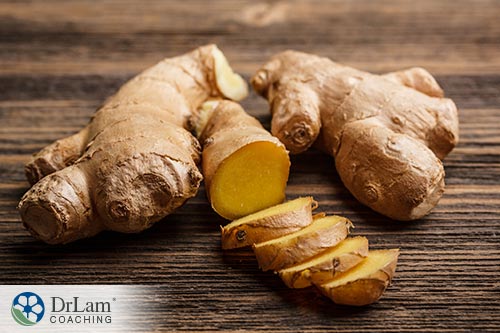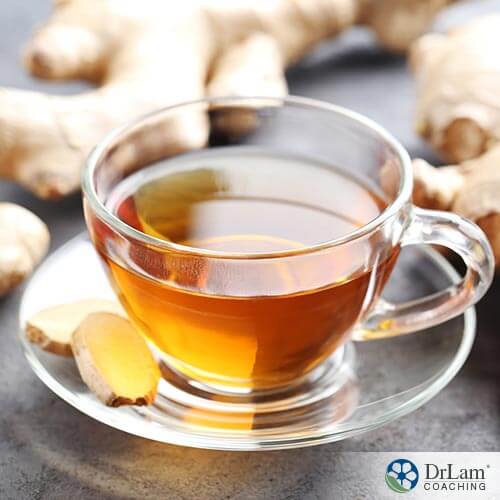 Ginger is one of the most commonly used and yet overlooked spices in your kitchen. Besides being spicy and delicious, it's been used as medicine for thousands of years. And research increasingly supports many of these uses. The benefits of ginger range from reducing inflammation to helping nausea, and there are several surprising benefits as well. So if you needed more reasons to eat this spice, then here are some ways ginger can help your body along with adding flavor to your food.
Ginger is one of the most commonly used and yet overlooked spices in your kitchen. Besides being spicy and delicious, it's been used as medicine for thousands of years. And research increasingly supports many of these uses. The benefits of ginger range from reducing inflammation to helping nausea, and there are several surprising benefits as well. So if you needed more reasons to eat this spice, then here are some ways ginger can help your body along with adding flavor to your food.
Ginger is a flowering plant originally from Southeast Asia and is closely related to spices like cardamom and turmeric. The part that you use in cooking is known as the rhizome, which is the underground section of the stem, and it can be used dried, fresh, powdered, or as a juice or oil. You may also find ginger in some of your cosmetic products.
You can use ginger in sweet or savory recipes and it is very popular in Asian dishes. It’s extremely nutritious and contains nutrients like:
Although gingerol is the most important component, ginger also contains other substances that help reduce inflammation and are powerful antioxidants that may contribute to its health benefits.
Ginger is a very versatile ingredient that can be used in a number of different ways, including:

The most benefits of ginger can be had when it is closest to its fresh form. You can also take ginger in supplement form, but you should always try to get giner from your diet first.
There has been a fair amount of research on ginger, which is why there’s so much scientific evidence supporting the benefits of ginger. These include:
Ginger has been used for years to help fight nausea caused by motion sickness. It has also been used for nausea or vomiting in pregnant women, although it may not be as effective for this. Almost anyone can use ginger safely as it absorbs quickly and produces no side effects. Some people even use it to help relieve nausea post-surgery.
Ginger has been shown to have antiviral and antibacterial effects. In this role, it's been used to help:
In Chinese Medicine, ginger is often used to help support the digestive process. There is anecdotal evidence as well as clinical trials supporting this claim. Ginger may also help stimulate the appetite, alleviate diarrhea, and reduce flatulence.
Ginger has powerful anti-inflammatory effects, mostly because of its gingerol content. This may help with:
Ginger may help to boost your metabolism, which is why it helps with weight management and accelerates weight loss.
Animal studies have shown that ginger can help prevent hepatotoxicity or liver damage caused by taking in a heavy metal known as cadmium. However, scientists need to do further research to confirm this effect. Therefore, never avoid conventional treatments in favor of taking ginger without a doctor’s supervision.
Ginger helps reduce prostaglandins, lipids that are made at the sites of damage or infection. Reducing the levels of these lipids can help relieve some of the pain and discomfort of menstrual cramps.
One of the most important benefits of ginger is the fact that it can lower bad cholesterol levels (LDL) and increase good cholesterol levels (HDL). This will help prevent the build-up of plaque around your heart, an issue that’s often responsible for heart disease and damage. Ginger may also help lower your risk of blood clots, further protecting heart health.
Surprisingly enough, ginger may also help regulate blood sugar levels, which may help with better control of type 2 diabetes.
Ginger has been used to increase sexual desire and activity for years. This may be because of its scent and because it helps increase blood flow throughout the body, including in the sexual organs.
High blood pressure can damage your heart, arteries, brain, kidneys, and even eyes. One of the most important benefits of ginger is that it can help lower your blood pressure without the need for harsh medications. Ginger is a vasodilator, which means it expands your blood vessels, improving circulation and blood pressure.
 Many of the most important benefits of ginger could also be very helpful if you have Adrenal Fatigue Syndrome (AFS). This disorder occurs when long-term stress causes imbalances in the NeuroEndoMetabolic (NEM) stress response. This stress response consists of six circuits composed of key organs and systems. These components work together to perform essential functions in the body as well as to protect you against stress.
Many of the most important benefits of ginger could also be very helpful if you have Adrenal Fatigue Syndrome (AFS). This disorder occurs when long-term stress causes imbalances in the NeuroEndoMetabolic (NEM) stress response. This stress response consists of six circuits composed of key organs and systems. These components work together to perform essential functions in the body as well as to protect you against stress.
The adrenal glands are a key driver of the NEM stress response as they produce the stress hormone cortisol. When the stress response becomes overworked because it’s continuously active, the adrenal glands can start to fatigue. This can cause imbalances in the NEM stress response as well as in the circuits.
AFS causes a range of problems, symptoms, and disorders, some of which may be relieved or reduced by taking ginger. This will help reduce stress overall and correct circuit imbalances, allowing better functioning.
Some issues related to AFS that ginger may help with include:
AFS is associated with high levels of inflammation due to immune system dysfunctions, gut problems, and imbalances in the Inflammation circuit. By relieving some of this inflammation, ginger may help correct some of these symptoms.
Immune system malfunctions in AFS can cause ongoing and persistent infections from viruses, bacteria, and fungi. Fortunately, ginger may help address some of these issues by fighting infections and boosting your immune system.
Gut problems like diarrhea, constipation, and a leaky gut are very common in AFS due to imbalances in the balance of bacteria in the gut, poor absorption of nutrients, and other issues. This is why many people with AFS experience gut-related problems. Ginger may help relieve some of these issues, making you more comfortable and helping to rebalance the body’s related circuits.
Many people with AFS experience weight gain due to digestive problems and high cortisol levels. Ginger could help with weight loss.
Many people with AFS experience symptoms related to heart health such as arrhythmia, high cholesterol, and high blood pressure. Ginger could help to alleviate some of these symptoms.
Eating a healthy diet can be difficult sometimes. There’s so much advice out there on what you should be eating and how much and when, it can be overwhelming. That’s why a simple approach is often the best way to go. As the benefits of ginger prove, even the simplest spices can do your body a lot of good.
Here’s how to get the benefits of this spice:
If you’d like some help and guidance with designing the right diet for you, you can talk to our team at +1 (626) 571-1234 or click here.
Ginger is tasty and easy to add to food, which is a bonus because it’s also amazingly good for you. Some of the most important benefits of ginger have to do with its calming effects on your gut and ability to reduce inflammation, but this isn’t all that this spice can help with.
